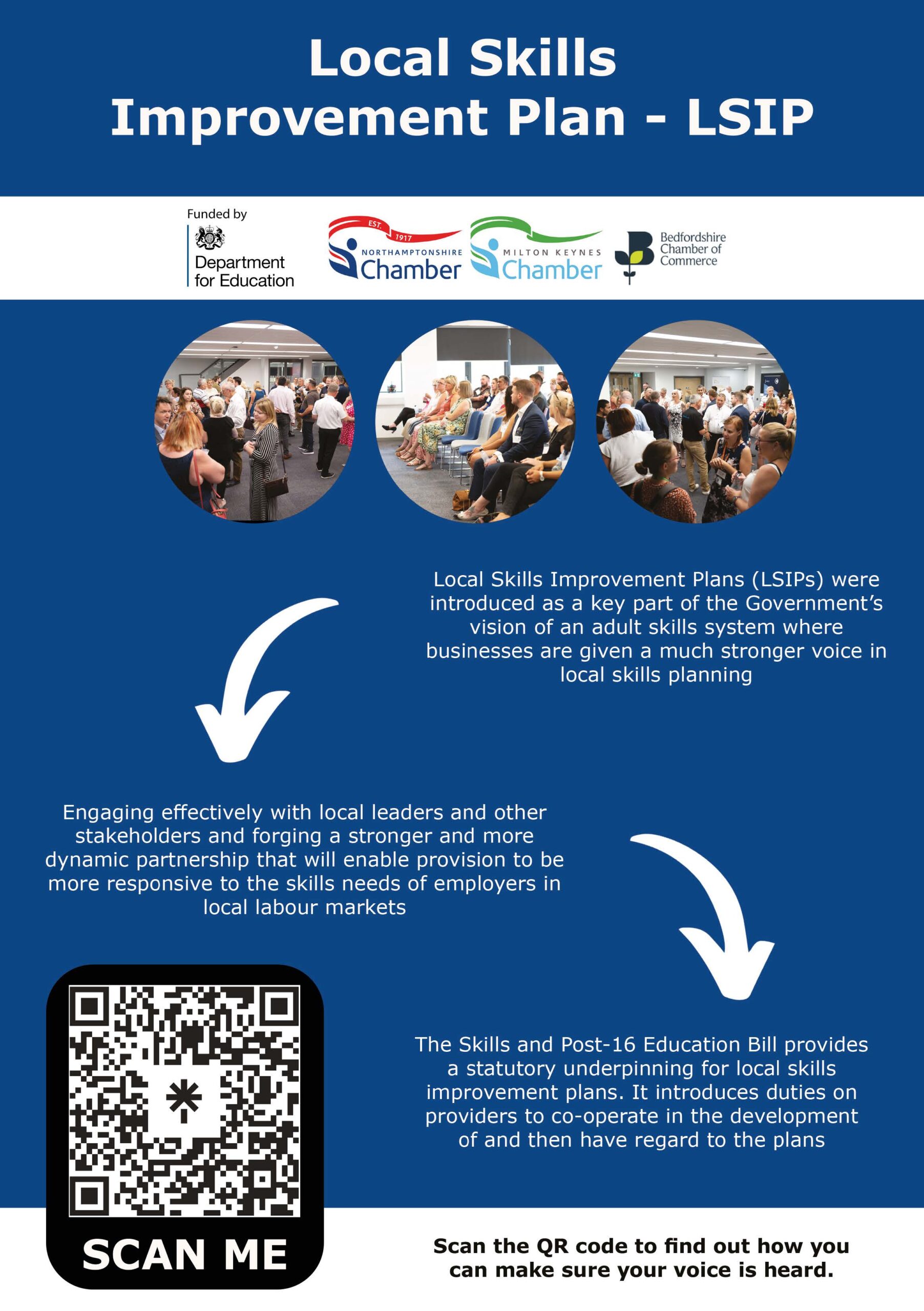A local skills improvement plan to give employers a stronger voice in shaping local skills provision is being led by the three local Chambers of Commerce in the region – working together with a range of stakeholders such as local authorities, colleges and other skills providers, business networking groups and JobCentres to engage businesses and identify regional needs.
The Local Skills Improvement Plan (LSIP) scheme was launched by the Government last year as part of the Skills White Paper to encourage employers to engage effectively with skills providers, local leaders, representative bodies and other stakeholders and enable Further Education (post-16) provision to be more responsive to the needs of employers in local labour markets.
Northamptonshire Chamber of Commerce, in conjunction with Milton Keynes and Bedfordshire Chambers successfully applied to the Department of Education to be the local Employer Representative Body (ERB) for the South East Midlands Local Enterprise Partnership (SEMLEP) and work has now begun to prepare a report for the Secretary of State into the current position and future needs.
There are some 38 ERBs across England (one for each Local Enterprise Partnership) and each ERB will work with employers, providers and key stake-holders to develop evidence-based, credible and actionable LSIPs, setting out the changes needed in a local area to make skills training a better fit for businesses’ needs.
By engaging as many businesses with providers as possible in its research, the ERB hopes to highlight the skills most needed in the workplace, and which skills employers are struggling to and locally.
LSIP Executive Committee Chair Kevin Rogers, who is also Chair of regional law firm Wilson Browne Solicitors, former NLS Solicitor of the Year, Past President (and current Director) of the Northamptonshire Chamber of Commerce, Director and Chair of Guilsborough Multi Academy Trust, SEMLEP Enterprise Advisor (since 2015), and an experienced Non-Executive Director, Advisor and Consultant to regional and national businesses, said:
“Originally designed by the government ‘to place employers at the heart of local skills systems’ our region’s LSIP will achieve that, and so much more.
“No meaningful set of actionable priorities could be achieved without hearing every voice, and so I am delighted to see – starting with the Executive Committee – representation from providers, employers, our local authorities and representative bodies. We start with a blank page, and without preconceptions. We already have amazing talent and provision in local education. We already have skilled workers, dedicated engaged employers, supportive bodies and LAs. However, present and future challenges remain. is is where the Chamber comes in, linking all these bodies together in a way that – for our region – no other can. I look forward to businesses adding their voice: I ask people to engage, to get their business to engage, to attend the events, air their voice, and return the key questionnaires. Make the phone calls, be part of the priorities that are set, and drive the change. If you are not in the room, you cannot be in the conversation! I know that this region, this brilliant part of our nation, has such a positive future. With your help, it will be the very best that it can be, for we truly are #strongertogether.”

Tony Knaggs, who is working with Northamptonshire Chamber and the Milton Keynes Chamber to help deliver the aims of the ERB is aiming to ensure the programme will engage with as many employers and skills providers as possible over the next three to four months with a view to having a list of skills priorities and a workable roadmap in the report, which is due to be completed by May 31.
“The message we want to get out to businesses now is that you can have your voice heard,”
said Tony.
“We know there are some 83,000 businesses in the SEMLEP area and we want to engage with enough to create a critical mass that will allow stakeholders and commissioners to make some informed decisions about what our area needs in terms of skills.“Between now and early April we are holding a series of focused events, some face to face and some online, where employers can have their voice heard about the skills challenges they may be facing, and if employers wish to engage with us online instead we’ve produced an employer focused questionnaire that is available now.”
The LSIP report will feed into the Government’s Levelling Up White Paper and funding is being made available to the Further Education (post-16) sector to enable skills providers and employers to work together to address skills needs within Northamptonshire, Bedfordshire and Milton Keynes.
A programme of events and an employer questionnaire will be supported by employer membership organisations such as the IoD, CBI, NNBN and FSB, who will be feeding information through to their memberships and encouraging participation. e intention is to identify both the generic issues that affect all businesses, and those that are sector specific.
The likes of Careers Hubs and Job Centres will also be included, with learners and those not in employment invited to give their thoughts on the skills they believe they might need and where there are gaps.
Tony Knaggs added:
“Whilst the LSIP is focused on the existing workforce and looking to ensure that skills providers and employers engage more, the next generation of our workforce are still at school, that’s where I think we all realise we have to feed into in order to create long lasting change. It’s a bit of a balancing act in that no-one wants to lose creativity and being able to have a diverse skills port-folio of provision available but I think we all realise that we do need to align skills provision to current business needs more effectively.
“As well as engaging with organisations in our key sectors such logistics, manufacturing, digital, net zero, retail, care and others, we are also looking to gather data from organisations who understand why people are, and are not, in work such as Job Centres, skills providers delivering programmes to help people get into work, and the recruitment sector. ere is already a lot of information out there about skills, skills issues and skills needs and the Further Education sector has done some great work in terms of partnering with employers to gather this, we now need to expand on it and bring it all together to get a clear picture of where we are now, what the local employment landscape looks like and what we need to be focusing on as our priorities for the next few years.
“By the end of May, when the LSIP report goes to the Secretary of State for Education, the intention is that we will have drawn on the insights and feedback and identified needs from as many organisations as possible, have identified our key local skills priorities and have a roadmap on how employers and the FE sector can work closer to deliver on those priorities.
“If we get to that point with four or five key points to take forward over the next few years, then we’ll have something we can revisit and build upon and that will really make a difference.”

Louise Wall, Chief Executive of Northamptonshire Chamber and the Milton Keynes Chamber, added:
“Government recognises that employers know what is needed for their businesses and, through the Local Skills Improvement Plan, the Chambers across our region will be diligently gathering the information and then presenting a ‘living’ report that identifies the true needs of employers and maps out a plan that can deliver the skills provision that businesses require.
“We also have great links with our education providers, trade bodies and local authorities so it will be exciting to be working with them on the LSIP and to be speaking to businesses of all sizes and sectors on what their skills needs are.”
Justin Richardson, Chief Executive of the Bedfordshire Chamber of Commerce, said:
“Skills shortages are regularly highlighted by businesses as a key recruitment issue and the Local Skills Improvement Plans are an exciting opportunity for Chambers of Commerce across the region to bring together employers and key stakeholders to set out the priorities needed to ensure local provision is reflective of emerging skills needs.
“It’s fantastic to be a key part of the vision where businesses are given a much stronger voice in local skills planning and putting the needs of business at the heart of the skills system.”
To find out more about how to get involved with the LSIP and how you can make sure your voice is heard, scan the QR code.














